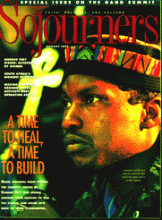The Kairos Document released in 1985 by South African church leaders posed "a challenge to decisive action" to the country's church, its Christians, and implicitly all of its people. It called for repentance, conversion, change, and ceaseless confrontation of the "evils" of apartheid. But how many have taken it up? Have we missed the moment of truth, the moment of grace--the kairos--or does it still await us?
The country's first democratic elections have been set for next April, no doubt a political milestone. But while the politicians have haggled, most South Africans have watched from the sidelines, sitting out this strange dance of national negotiations. People feel detached, even alienated, from the political "leaders," if they deign to call them that. Many "liberal" white South Africans are leaving the country. Others just tune out the daily news--more violence, more deaths.
The white right wing feels totally betrayed by government and has announced its total opposition to the April elections, including a "full-scale mass action campaign" to begin this fall. Many of the black majority--particularly the youth--distrust the political process, and for them "decisive action" means stayaways, boycotts, torching homes and vehicles, or worse.
Following its activism in the late '80s, the church retreated in the first three years of the decade, giving its initiative for the National Peace Accord, baldly put, into the hands of business leaders and politicians. Though in the last few months--with the Anglican Church's call for national disarmament and the recent announcement of a multifaith panel to monitor the forthcoming elections--religious leaders have shown signs of their old assertiveness.
Read the Full Article

